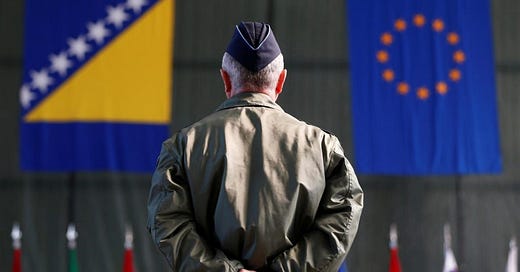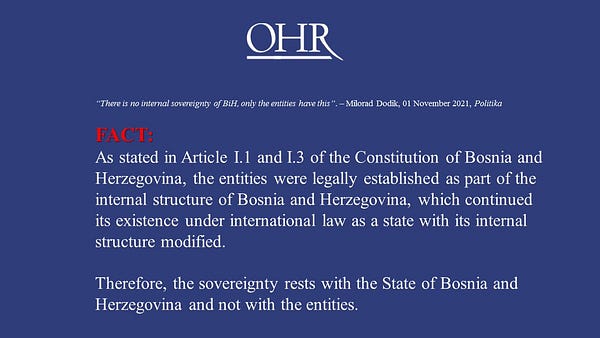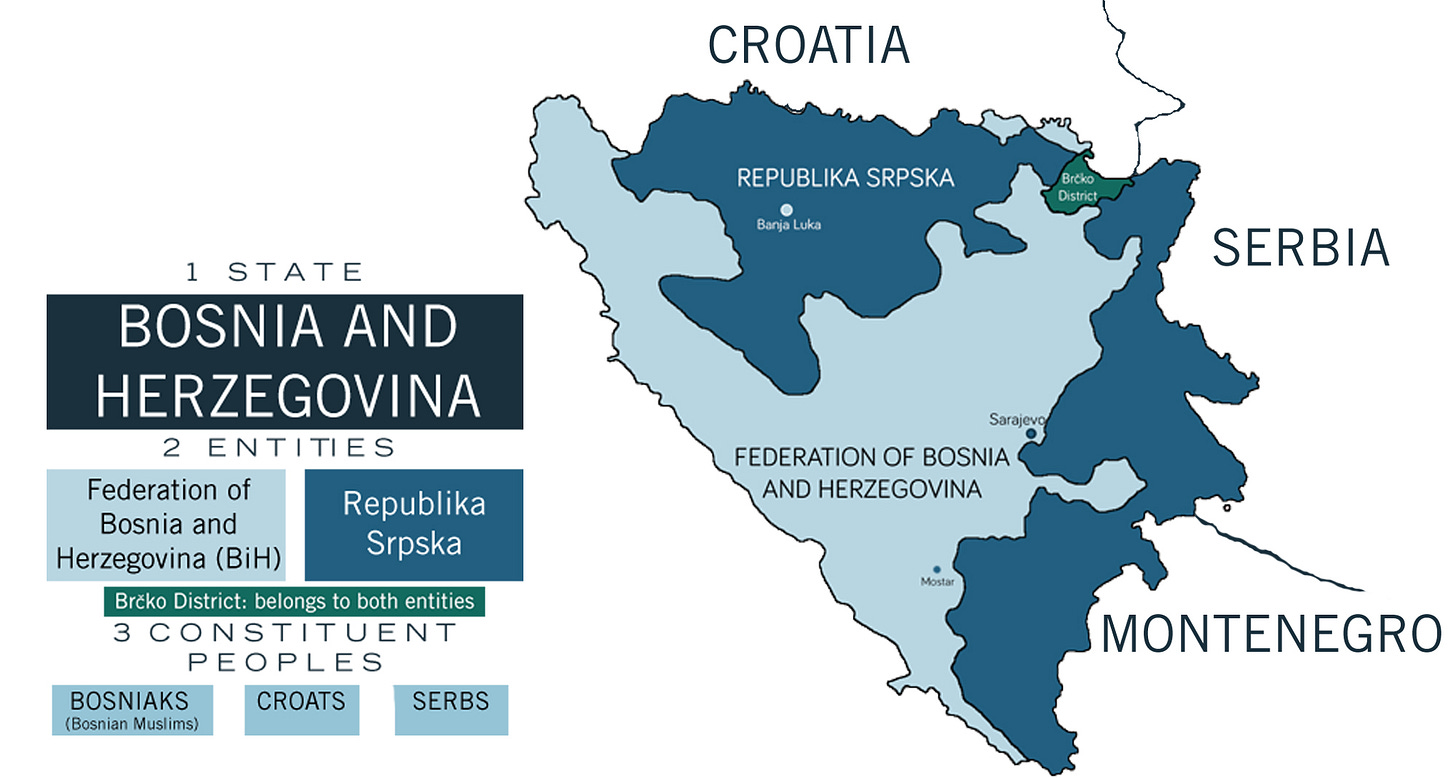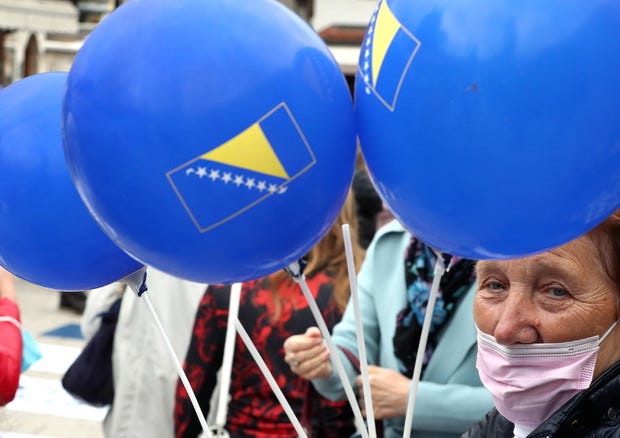S2E14. Why Bosnia is restless
Some secessionist statements by the Bosnian Serb leader, Milorad Dodik, have created the «greatest existential threat of the post-war period» for the country
Hi,
welcome back to BarBalkans, the newsletter with blurred boundaries.
Today we start from Helsinki.
Finland tried so hard not to play a crucial 2022 World Cup qualifying match in Bosnia and Herzegovina. Something huge must have happened.
The football match scheduled for today (Saturday, November 13) in the city of Zenica was at risk of being cancelled due to some issues that have nothing to do with sport.
The president of the Football Association of Finland, Ari Lahti, asked UEFA to move the match to a neutral venue and even the Foreign Minister, Pekka Haavisto, said he was «particularly worried» about the crisis in the country.
In order to understand what happened, we have to go in Banja Luka, in the heart of the Bosnian Serb entity.
«The greatest existential threat»
In recent weeks, secession and conflict in Bosnia have become a «very real» prospect.
The alarm was raised by the High Representative for Bosnia and Herzegovina (OHR), Christian Schmidt.
On October 29 he sent a report to the UN Secretary General António Guterres. Schmidt warned of the risk that the country will face, if the Bosnian Serb separatists implement their plan to recreate their own army.
«It is tantamount to secession, without proclaiming it», the High Representative accused. «It will be necessary to strengthen the presence of international peacekeeping forces, to prevent a new conflict in Bosnia».
There is more. «A lack of response to the current situation would endanger the Dayton Agreement, while instability in Bosnia and Herzegovina would have wider regional implications», Schmidt wrote.
Buntly speaking, this is «the greatest existential threat of the post-war period» for Bosnia and Herzegovina.
Milorad Dodik, former President of Republika Srpska and currently the Bosnian Serb member of the Presidency of Bosnia and Herzegovina, pulled the trigger.
On the 30th anniversary of the establishment of the Parliament of the Serbian people in Bosnia and Herzegovina, the leader of the Alliance of Independent Social Democrats (SNSD) promised a de facto secession.
The goal is to pull out the Bosnian Serb entity of State-level institutions, including in the field of defense, tax administration and justice.
The creation of a separate armed force is crucial in the secession plan and Dodik threatened to use violence to drive Bosnian troops out of Republika Srpska territory.
«Within the framework of constitutional principles and Dayton Agreement, we will restore the competencies transferred from Republika Srpska to the central institutions of Bosnia and Herzegovina», Dodik menaced. «This is the way to defend the Serbs of Bosnia».
Moreover, Republika Srpska leaders want to take legislative measures to suspend 140 laws adopted by the High Representative over the past 26 years. «These laws were imposed on us», Dodik attacked.
These measures gave BiH institutions powers in crucial areas, such as defense and justice.
The Bosnian Serb member of the Presidency said that «today, life in Bosnia would be better if Republika Srpska had not been stripped of its rights for years».

A failed State
The reason why this crisis threatens to shake all the constitutional structure of Bosnia and Herzegovina is related to the fact that the respect of the Dayton Agreement is being questioned.
The Dayton Agreement was signed in November 1995 under U.S. diplomatic pressure to put an end to the Bosnian civil war (which began three years earlier).
The peace agreement signed by the representatives of the three ethnic groups in conflict - Serbs, Croats and Bosniaks - defined a precise path of institutional stabilization for the country.
Post-Dayton Bosnia is a multi-ethnic and unitary State, with advanced forms of decentralization, responding to the need to guarantee a margin of autonomy to the three “constituent” ethnic groups.
The most evident consequence is the division into two entities, that correspond to the territorial boundaries emerged from the conflict. The Federation of Bosnia and Herzegovina - populated mainly by Bosniaks (Bosnian Muslims) and Bosnian Croats - and the Republika Srpska - characterized by Bosnian Serb ethnic homogeneity.
In addition to the division into two entities, the essential feature of the Dayton Agreement is the complex system of institutional checks and balances. Such as the Presidency of Bosnia and Herzegovina, a three-member body (one from each constituent people) which serves as head of State.
However, safeguarding the rights of ethnic groups has created a series of veto powers that block decision-making processes.
Institutional stalemate is the trademark of Bosnian political life, unblocked only with the intervention of the international community.
For this reason Bosnia is often perceived and defined by the other countries in the region as a failed State.
Concerning the competencies of central institutions and of the two entities - the casus belli of Dodik’s declarations - the answer can be found in the Constitution of Bosnia and Herzegovina.
Even if it was conceived as a transitional solution included in Annex IV of the Dayton Agreement, the Constitution establishes in Article 3 that «all functions and competencies that are not explicitly attributed to the institutions of Bosnia and Herzegovina shall rest with the two entities».
The decisions adopted by the High Representative during the last 26 years (the «imposed laws», according to Dodik) laid the foundation for the creation of the central institutions and better specified their exclusive competencies.
This is not the first time that Republika Srpska officials have criticized the work of the High Representative, referring to «powers taken away» or «restoration of competencies».
This is a trend towards independence for the Bosnian Serb entity.
At the same time, exacerbating political tensions is also a way to divert public opionion from corruption scandals and the worsening economic situation (which forces many Bosnians to emigrate).
These threatening statements allow political leaders not to take responsibility for misrule. They can continue to govern in a climate of tension and fear.
General elections scheduled for 2022 are anticipated by a campaign full of nationalistic and divisive rhetoric on a ethnic level.
The most urgent issue should be a serious electoral reform, which would allow all citizens - not only the members of the three constituent peoples - to be able to run for the Presidency of Bosnia and Herzegovina.
On the contrary, at the moment the biggest concern is that Republika Srpska may hold a referendum on independence from Bosnia.
A scenario that is now more real, because of Dodik’s incendiary statements. The risk of new ethnic tensions in a region that already experienced one of the bloodiest conflicts in recent European history is around the corner.
Who blows on fire
It is clear that the main troublemaker in this institutional and ethnic crisis is the leader of the Serbs of Bosnia.
Milorad Dodik was born in 1959 in Banja Luka, the capital of the Bosnian Serb entity. He has a degree in Political Science and has been in politics for more than 30 years.
During the war in Bosnia he was the head of the only party that opposed Radovan Karadžić, former President of the Serbian Republic of Bosnia and Herzegovina: he was removed in 1996 and sentenced to 40 years for war crimes (here you can read more about it).
In 2001, Dodik founded the Alliance of Independent Social Democrats, which has consistently won the presidential elections in the Republika Srpska since 2006. From 2010 to 2018 the Presdient was Dodik himself.
His opposition to Karadžić’s genocidal policies has always made him acceptable for the United States and Europe. But in recent years Dodik «has turned into an unscrupulous nationalist», who «carefully followed the manual of the perfect Serbian autocrat» The New York Times commented.
While the majority of the Balkan countries are moving closer to the European Union (as you can read here), the leader of Republika Srpska has aligned with Vladimir Putin’s Russia. Balkan Insight noted that Dodik is the politician who met most often the Russian president among all the Balkan leaders.
It is no coincidence that Dodik assured that he has «friends who have pledged their support» for the plan to withdraw Republika Srpska from the central authority. He meant Serbia and Russia.
The negotiations on the renewal of the international peacekeepers’ annual mandate (namely the European soldiers of EUFOR and the NATO contingent in Sarajevo) is a clear proof.
After Russia threatened to block the Resolution, the reference to the “Bonn powers” of the High Representative disappeared.
The “Bonn powers” allow the OHR to introduce legislative measures and to fire local officials who oppose the implementation of peace agreements.
Just a few days later, U.S. Deputy Assistant Secretary overseeing policy towards the Western Balkans, Gabriel Escobar, said he is working with the EU to «ensure that any illegal or destabilizing actions will be punished»

Speaking of European Union, there is another actor that is trying to carve out an increasingly central role in the Serbian area.
It is Viktor Orbán’s Hungary.
«We are grateful for Hungary’s sympathy to Republika Srpska and we are always ready to host our good friends», Dodik welcomed the Hungarian Prime Minister during his visit to Banja Luka on November 6.
The core of the relations between Budapest and the Serbian world in the Balkans is the Foreign Minister, Péter Szijjártó, who has already received a State honor in Serbia.
Morover, on September 23 and 24, Dodik traveled to Budapest for a summit of the European far-right parties.
The visit of the Hungarian Prime Minister to Republika Srpska has been interpreted as a clear act of political support to Bosnian Serb entity, since it came in the days of the greatest tension with the international community.
Pit stop. Sittin’ at the BarBalkans
We have reached the end of this piece of road.
Today our bar is a place that recalls the unity and the multiculturalism of Bosnia and Herzegovina.
This is Sarajevo ‘84, a genuine tavern founded in the center of the Slovenian capital Ljubljana (which welcomed me at the end of the EU-Western Balkans Summit in October).
Here, Europeans facing the Balkans for the first time can discover all the Bosnian specialties.
From ćevapčići to ajvar, Bosnian coffee to pelinkovac and Sarajevsko Pivo, the national beer since 1864.
Everyone is welcomed at the bar of Sarajevo ‘84, while any kind of division is not.
At least here, a united country doesn’t feel like a pipe dream.
Let’s continue the BarBalkans journey. We will meet again in a week, for the 15th stop.
A big hug and have a good journey!
BarBalkans is a free weekly newsletter. Behind these contents there is a lot of work undertaken.
If you want to help this project to improve, I kindly ask you to consider the possibility of donating. As a gift, every second Wednesday of the month you will receive a podcast with an article about the dissolution of Yugoslavia.
Every month you can listen to the preview of BarBalkans - Podcast on Spreaker and Spotify.
Pay attention! The first time you will receive the newsletter, it may go to spam, or to “Promotions Tab”, if you use Gmail. Just move it to “Inbox” and, on the top of the e-mail, flag the specific option to receive the next ones there.
As always, I thank you for getting this far with me. Here you can find all the previous newsletters.
BarBalkans is on Facebook, Twitter and Instagram. The updated archive is on Linktree.














